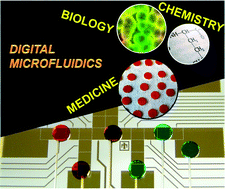Digital microfluidics: a versatile tool for applications in chemistry, biology and medicine
Abstract
Digital microfluidics (DMF) has recently emerged as a popular technology for a wide range of applications. In DMF, nanoliter to microliter droplets containing samples and reagents can be manipulated to carry out a range of discrete fluidic operations simply by applying a series of electrical potentials to an array of patterned electrodes coated with a hydrophobic insulator. DMF is distinct from microchannel-based fluidics as it allows for precise control over multiple reagent phases (liquids and solids) in heterogeneous systems with no need for complex networks of connections, microvalves, or pumps. In this review, we discuss the most recent developments in this technology with particular attention to the potential benefits and outstanding challenges for applications in chemistry, biology, and medicine.


 Please wait while we load your content...
Please wait while we load your content...